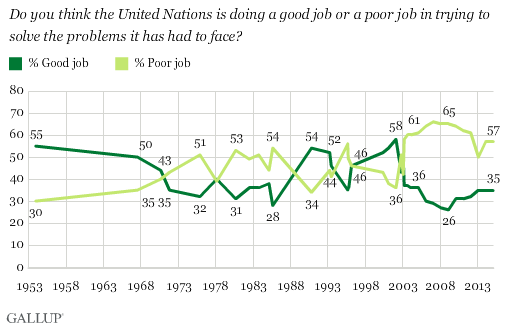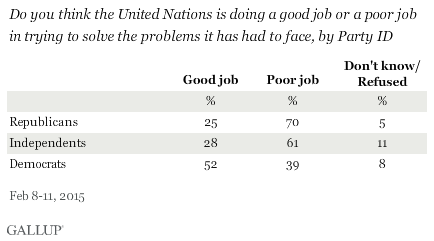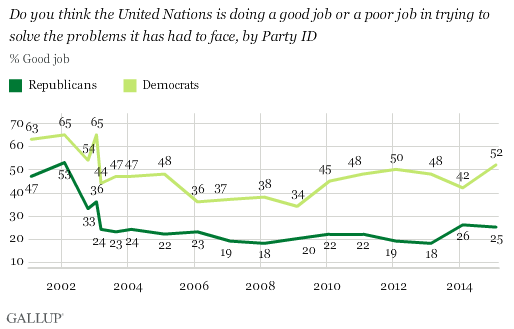Story Highlights
- 57% of Americans say United Nations doing "poor" job
- Little change over the last three years
- Democrats much more positive about the UN than Republicans
PRINCETON, N.J. -- Although there is no shortage of threats to peace and security around the world today, Americans do not see the United Nations doing any better at solving the problems it has had to face than has been the case in recent years. The majority of Americans continue to say the UN is doing a poor job, while slightly more than one-third say it is doing a good job.

The latest update on these attitudes is from Gallup's Feb. 8-11 World Affairs survey. Gallup first asked about the United Nations in 1953, eight years after the UN officially came into being in October, 1945. In the December 1953 survey, 55% of Americans said the UN was doing a good job, while 30% said it was doing a poor job. This positive reaction may have partly reflected the United Nations' role in the Korean War, which ended a few months earlier in July. Ratings of the UN have varied substantially in the decades since, reaching a high of 58% shortly after the 9/11 terrorist attacks, and a low of 26% in February 2009.
Outside of the first reading in 1953, more than half of Americans have given the UN a good rating in only two periods: surveys conducted in 1990 and 1993 -- before and after the first Persian Gulf War -- and in each year from 2000 to 2002. Americans' views of the UN soured in 2003 and have remained relatively low ever since. This drop, at least initially, may reflect the disagreements between U.S. leadership and the United Nations over the U.S. invasion of Iraq.
An average 39% of Americans have rated the job the UN is doing as "good" since Gallup began asking the question 62 years ago, putting the 35% reading over the past three years just below average.
Americans from different partisan persuasions see the United Nations in significantly different ways. Democrats are more than twice as likely as Republicans to say the UN is doing a good job. Democrats are also the only political group to view the UN positively, with 52% saying the UN is doing a good job, compared with 28% of independents and 25% of Republicans.

This partisan split in attitudes toward the United Nations is not new. Republicans' and Democrats' views of the UN have fluctuated over the past 14 years since Gallup began asking the question on an annual basis, but the gap between the two parties has persisted.

Implications
The charter of the United Nations states that the purpose of the body is to maintain "international peace and security" and "to take effective collective measures for the prevention and removal of threats to the peace, and for the suppression of acts of aggression or other breaches of the peace …" There is certainly no shortage of situations where the United Nations could play a role, including fighting in Ukraine, Africa, the Middle East, Syria, Iraq and Afghanistan -- but few notable examples of the United Nations taking steps that reduced any of this violence.
Because the wording of Gallup's question asks about the job the UN is doing "in trying to solve the problems it has had to face," the persistence of these world conflicts, wars and often bloody disputes helps explain why Americans tend to say the UN is doing a poor job. In the few instances where Americans have approved of the international body, it has been at times when the United Nations has approved a U.S.-led response to an international crisis, such as the Persian Gulf War.
Many international crises today are not the traditional country-against-country conflicts that typified the wars that preceded the UN's founding, but actions by groups that operate across borders and that have no specific national identity. This may make it more difficult for the UN to actively intervene or remove these "threats to the peace," and may help explain why the UN has been not as actively in the forefront of attempts to address these conflicts. Furthermore, much like Americans' dislike of gridlock in Congress, the UN's inability to come to one mind concerning major problems may further discredit it in Americans' eyes. Whatever the reason, the majority of Americans continue to give the United Nations a poor grade at this juncture in history.
Survey Methods
Results for this Gallup poll are based on telephone interviews conducted Feb. 8-11, 2015, on the Gallup U.S. Daily survey, with a random sample of 837 adults, aged 18 and older, living in all 50 U.S. states and the District of Columbia. For results based on the total sample of national adults, the margin of sampling error is ±4 percentage points at the 95% confidence level. All reported margins of sampling error include computed design effects for weighting.
Each sample of national adults includes a minimum quota of 50% cellphone respondents and 50% landline respondents, with additional minimum quotas by time zone within region. Landline and cellular telephone numbers are selected using random-digit-dial methods.
View complete question responses and trends.
Learn more about how Gallup Poll Social Series works.

